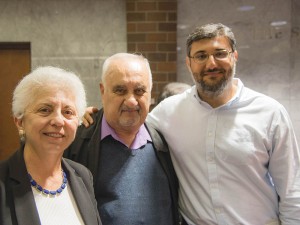
Photo: Hourig Attarian
Elina Karapetyan
Staff Writer
There has been a long-standing, Turkish government political tradition to deny the Armenian Genocide. During a special presentation on Wednesday, February 10 Clark University doctoral candidate Ümit Kurt gave a talk entitled, “Why Does Turkey Deny the Armenian Genocide?” to provide some answers to the question. This lecture was part of the Armenian Studies Program Spring Lecture Series.
Kurt gave two main reasons for the Turkish government denial: first, he pointed out that the Turkish people do not have sufficient historic consciousness and historical knowledge about the topic. One of the reasons for this was because of the 1928 “revolution in writing,” when the Turkish alphabet was changed from Arabic to Latin characters so that people could no longer read what was written before 1928. They therefore only had access to the official Turkish thesis on the subject.
Second, Kurt noted that founding cadres of the Republic were composed of former Committee of Union and Progress members (for example Celal Bayar, Ali Cenani, Bekir Sami Bey, Tevfik Rüştü Aras), who were also responsible for the Genocide.
Kurt offered the audience several theories as to why the Turkish Government is still in a state of denial. First and foremost, denial served a vital function in the formation of Turkish national identity through the process of mythmaking about the origins of modern Turkey. By forgetting the past, and constructing a new past, the primary ideology was, “…we Turks did not murder Armenians; Armenians murdered us.” According to Kurt, this claim makes the act of forgetting an integral part of their society, because it was important for their creation of an official state.
Kurt believes that the main reason the Turkish Government avoids any discussion of its history and makes it a taboo to speak about the Genocide, lies in this connection between the Armenian Genocide and the foundation of the Turkish Republic.
“Forgetting has turned out to be a cultural code for Turkey to avoid facing the dark annals of its past,” he said. For Kurt an important aspect of this problem is to develop a social responsibility in order to fully confront the Genocide.
Kurt suggested that Turkish society’s reactions to its own history can be described as “pathological.” The Turks are unable to speak calmly about the subject because, as a nation, they feel confronted by serious accusations.
In nationalist discourse, this sentiment is perceived as an accusation that puts into question four thousand years of glorious Turkish history, and attributes to the Turkish nation a crime of which it is not capable. Thus, there is a deep fear of recognition because of what inevitably will follow, reparation and restitution.
“The presentation gave the audience new insight into why Turkey denies the Armenian Genocide. Kurt’s explanation of the political and sociological reasons behind the denial was helpful into understanding why the Turkish state continues its policy of denial,” said Armenian Studies Program Coordinator Professor Barlow Der Mugrdechian.
Umit Kurt has conducted extensive research and is the author of The Great, Hopeless Turkish race: fundamentals of Turkish nationalism in the Turkish homeland 1911-1916 and editor of The Revolt and the Destruction: Construction of the state of the Ottoman Empire to Turkish Republic and collective violence.
Kurt is working on his Ph.D. through the Holocaust and Genocide Studies Program in the History Department of Clark University.
 Hye Sharzhoom Armenian Action
Hye Sharzhoom Armenian Action